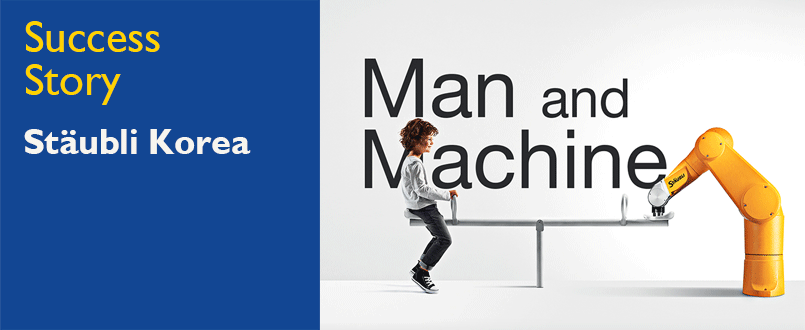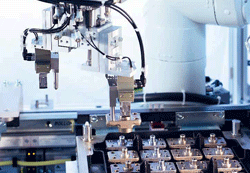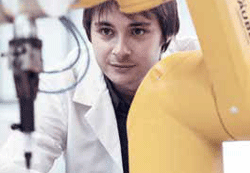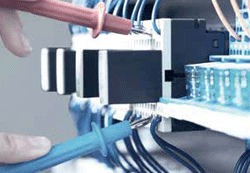

With its unrivaled expertise in mechatronics,
Stäubli Korea is more than ready to usher in the
Fourth Industrial Revolution
From the beloved, beeping R2-D2
from "Star Wars" or the villainous
T-1000 from the "Terminator"
films, robots have played leading
roles in more Hollywood blockbusters
than we can count. That’s probably why
images of shiny humanoids from sci-fi
films first come to mind when we think of
robots. But robots aren’t just fictional
characters popping up in films; they actually play a major role in our everyday
lives. And with the Fourth Industrial
Revolution to radically change the way
we live, countries like Korea are preparing to embrace this transformation.
According to a report by the International Federation of Robotics, Korea is
home to one of the world’s largest sales
markets for industrial robots. The country
is also expected to achieve an annual
growth rate of 5 percent in robot sales and
holds the top spot for the world’s highest
robot density, which refers to the ratio of
industrial robots to employees. Add to
that the Korean government’s active support and funding in the robotics sector,
and you have the perfect ecosystem for
mechatronics companies like Stäubli to
flourish.
“Stäubli knew that Korea was a country
with huge potential in the robotics industry,” says Moon-Seog Kim, business unit
manager of Staubli Korea. “The company
was confident that by doing business here,
it would be able to secure its competitiveness
on an international scale.”
Stäubli was first founded in
Switzerland in 1892 as a small workshop called
‘Schelling & Stäubli’. It then set up a
manufacturing site in France in 1909 and
further expanded its business in other
parts of the world, including the United
States, China, Japan and Korea. Over the
last 125 years, Stäubli has grown into an
international mechatronics solutions
provider with a global workforce of over
4,500 in 29 countries. The company currently focuses on three major activities—
connectors, robotics and textiles—serving
customers who want to increase their productivity in many industrial sectors.
Although the company initially focused on textiles, Stäubli Korea began specializing in connection solutions and robots in 2010. Despite its relatively short history in the robotics industry, Stäubli Korea has already signed MOUs with a number of Korean small and medium-enterprises to localize its products. Most notably, the company kicked off ‘TX2 Technology Day’ last month in
Daegu and Seoul to
showcase its latest lineup of TX2 robots to the Korean public.
The robots are being hailed by the
company as the next generation of
fast and precise 6-axis robots, as they
are “redefining performance with the
optimum balance of speed, rigidity,
size and envelope.” Most notably, the
TX2 robots can be used in all areas,
including the most harsh and restrictive environments.
“The new TX2 robots are a clear
example of what we can expect in the
Fourth Industrial Revolution because
they will further enhance the manufacturing capacity of smart factories”
says Kim. “The Korean government
is actively supporting the growth of
these factories, which will strengthen
the collaboration between man and
machine.
As Kim mentions, the Korean government is playing an indispensable
role in the rise of smart factories.
Earlier this year, the Ministry of
Trade, Industry and Energy announced that the private and public

sectors will work together to increase the
number of smart factories throughout the
country and help train people to work in
these factories.
When asked what the future holds for Stäubli, Kim says that thanks to Korea’s ideal business environment

and government support, the demand for robots will
increase. “Our products offer crucial solutions to challenges that can arise from the
Fourth Industrial Revolution. On this
note, I’m confident that Stäubli will gain a
more competitive edge here in Korea.”
